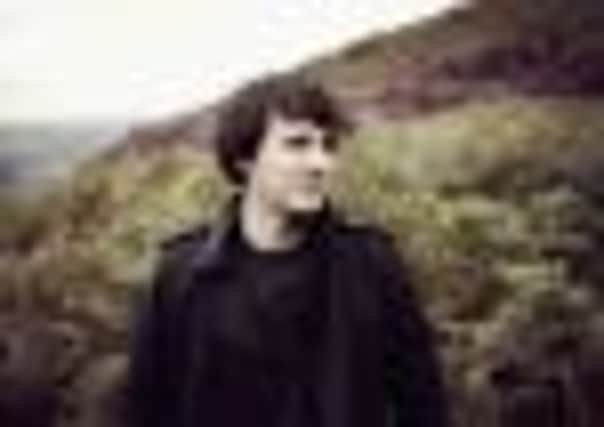Interview - David Roch: Exploring the dark side of love, existence and death


DURING an hour-long conversation with Sheffield songwriter David J Roch, the word “dark” crops up an awful lot.
That really shouldn’t come as a surprise. After all, Roch specialises in angst-ridden, melancholy confessionals, insists that depressing music “makes him happy”, and – when not playing to packed-out shows in Yorkshire and London – he spends his days working as an undertaker.
Advertisement
Hide AdAdvertisement
Hide Ad“Most people refuse to believe that’s my real job,” he says. “A friend of mine still thinks I’m having her on, and a lot of people think it must be a clever angle for the press. But when they accept that it’s true, they normally look at the kind of music I play and go, ‘Oh, well, I suppose that makes sense’.”
His music may be dark, but the current buzz surrounding Roch suggests his future could be very bright indeed. He’s been compared to the likes of Jeff Buckley, Leonard Cohen and Nick Drake, a recent tour with British Sea Power earned him rave reviews, and his debut album, Skin and Bones, is tipped to cause a stir.
Produced by Nick Cave cohort Jim Sclavunos, the album shows-off a rich array of epic, powerful ballads, which blend folk, blues-rock and jazz to create something utterly dramatic and compelling. Striking out from the music is Roch’s incredible voice, which ranges from a full-throttle falsetto howl to a stunning, rich baritone. The combination is nothing short of devastating.
“I have been called a ‘tortured soul’,” laughs Roch. “I suppose I’ve been in quite a dark place at times and the songs I make are very personal. I don’t do happy songs. I pour my heart and soul into them. I write about broken relationships, but it’s honest and to the point, rather than hiding it behind flowery imagery. I’m particularly inspired by Billie Holliday and Ella Fitzgerald, and that whole crossover period between jazz and blues. Those artists were dealing with terrible things that I can’t even comprehend, like racial segregation, and the dark undertones of their music really appeals to me.”
Advertisement
Hide AdAdvertisement
Hide AdRoch is hardly the stereotypical tortured artist though, and when the 28-year-old performs live he demonstrates a rather playful, eccentric sense of humour. During a recent acoustic show at Leeds Met, he made up for the absence of his usual backing musicians by treating the crowd to an improvised “trumpet” solo – using only his lips and clasped hands.
“My music may be dark but I like to have fun with it,” he says. “A couple of years ago I played Hay-on-Wye Festival and the crowd wanted an encore, so I launched into a cover of The Power Of Love by Jennifer Rush. That’s when people realised I don’t take myself too seriously.”
Raised in Dronfield near Sheffield, Roch won a music scholarship to the private Oakham School in Rutland, where he received classical training in piano, trumpet and violin. After leaving school he played in a number of bands around Sheffield, eventually turning to writing acoustic music and performing as a solo artist under the moniker of Little Lost David.
It was just over a year ago that he began his work as an undertaker. His father, a retired policeman, had taken up a job at a local funeral directors and Roch began helping out – doing odd-jobs and making coffins – and then began to attend the funeral services too. It was at this point that he found his songwriting taking on fresh inspiration.
Advertisement
Hide AdAdvertisement
Hide Ad“There have been experiences with the job that I’ve drawn upon for songs,” he explains. “I’ve always found myself drawn to religious imagery when writing lyrics, and I’ve been inspired by some of the things that vicars have said during services. It may sound morbid, but funerals are a celebration of life – just as love is. I’m not religious myself, but I find the relationship that people have with God fascinating. It’s certainly more interesting than your standard boy-meets-girl imagery.”
With his reputation and fanbase growing in Sheffield and beyond, Roch reached a crucial turning-point when he began working with Jim Sclavunos, a key member of Nick Cave’s influential bands Grinderman and The Bad Seeds.
The husband of Roch’s press agent, Sclavunos decided to take the young songwriter under his wing after attending one of his gigs, and produced his debut album Skin and Bones. With its dramatic orchestral arrangements and moody church organ, it boasts sinister love songs that Nick Cave himself would be proud of.
“Jim is a very demanding person, but that’s just what I needed,” says Roch.
Advertisement
Hide AdAdvertisement
Hide Ad“He challenged me. He deconstructed all of my songs, even questioning me about the lyrics to find out what I was trying to convey. He got inside my head.
“We took everything apart and built it back up again. At first I found the process quite tough, but I wasn’t going to argue – he’s six foot seven and he’s got a beard that makes him look like a KGB agent.
“Listening to the album now, you can tell exactly why he did what he did. I was known as Little Lost David for two years because, in a sense, that allowed me to hide behind a fake name. I don’t need to do that anymore.”
David Roch, Skin and Bones is out now. New live dates are due to be released soon on www.myspace.com/davidjroch